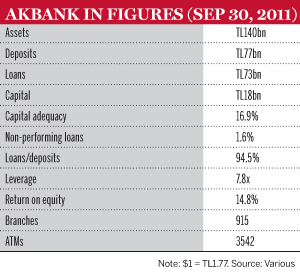The new CEO of Akbank, Hakan Binbaşgil, explains to Brian Caplen how the past decade has seen the bank transformed by its embracing of new technology, pioneering new channels, targeting Turkey's youthful population, and keeping the customer central to everything it does.
In The Banker’s Top 500 Banking Brands ranking for 2012 (see February issue), Akbank is the highest rated Turkish bank, in 96th place. New chief executive Hakan Binbaşgil attended January's conference in London to launch the ranking and explained the transformation that has taken place at Akbank over the past 10 years.
Editor's choice
“We changed almost everything,” said Mr Binbaşgil. “We redesigned the retail branches, we started to communicate more with our customers, we launched commercial, corporate and private banking branches. We started youth banking.
“The aim was to reshape the bank around the customer. In doing so we touched almost every part of the bank – human resources management, the IT infrastructure, corporate identity and communication.”
The aim was to reshape [Akbank] around the customer. In doing so we touched almost every part of the bank – human resources management, the IT infrastructure, corporate identity and communication
Along the way Akbank created one of the best liked and most remembered advertising campaigns in Turkey and its transformation project – conducted in the wake of Turkey’s 2001 banking crisis – became a case study for the Harvard University Kennedy School of Government.
Well qualified
Mr Binbaşgil is highly qualified to talk about the transformation project – he initiated it after joining the bank in October 2002 as executive vice-president in charge of change management. In November 2003 he was appointed executive vice-president in charge of retail banking, then deputy CEO in May 2008, before being appointed board member and CEO of the Bank in January of this year following the departure of Ziya Akkurt.
Having previously worked with Accenture, Mr Binbaşgil brought consultancy management skills to the Akbank project. He also previously held the position of executive vice-president in charge of retail banking at Pamukbank.
Key to the transformation of Akbank has been its embrace of new technology and its pioneering of new channels which have appealed to a customer base with a young profile.
In his presentation at the conference, Mr Binbaşgil noted that out of Turkey’s 73 million-strong population, 50% are under the age of 29, and the country has a larger workforce than any country in the EU at 45 million (Turkey is not in the EU). Mobile phone ownership in the country stands at 82%, and there are 65 million mobile subscribers. Some 65% of Turkish households have internet access, there are 31 million Facebook users in the country and 9 million mobile internet users. This has allowed the bank to take key initiatives such as self-service loan machines, mobile, internet and SMS loans.
Invisible customers
In an interview with The Banker, Mr Binbaşgil said: “Between 2 million and 2.5 million of our customers we don’t see at all – they do everything either online or at ATMs. Two-thirds of total transactions are done outside branches and 95% of withdrawals are from ATMs.”
The old Turkish banking model revolved around taking deposits and investing in treasury bills. In 2001, this accounted for 80% of the sector's income, but now the majority comes from customer services, although Akbank still has one-third of its assets as treasury bills. This is likely to decrease as the bank picks up more customer business from the fast-growing Turkish market, which still has 15 million to 20 million people unbanked. The total loans-to-gross domestic product ratio is a low 48%, while growth is strong and the middle class is expanding.
“What I have in mind for Akbank is that we will grow in all segments in a profitable manner. There is huge potential in areas such as consumer and small and medium-sized companies. These are the areas where we have a competitive advantage,” says Mr Binbaşgil.
A legacy of the 2001 economic crisis in Turkey is that the country has tough banking regulations and high capitalisation – 16.9% in Akbank’s case. Mr Binbaşgil says: “We have complained about it [the tough regulations] but we also see the benefits of a well-regulated marketplace.”
But how will Akbank put its large quantities of capital to use? “We have a lot of capital and we could use it to invest outside Turkey but we don’t want to lose our focus. If there is an opportunity we have to make sure it’s the right target so that we don’t waste time,” says Mr Binbaşgil.



